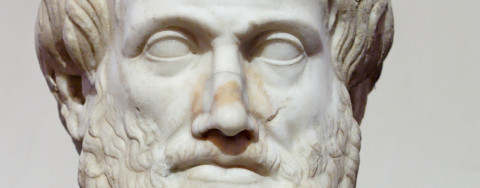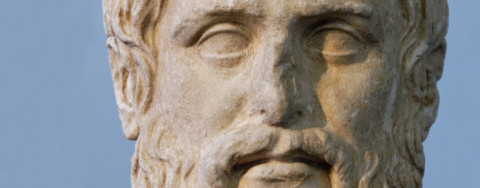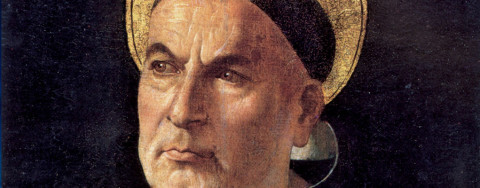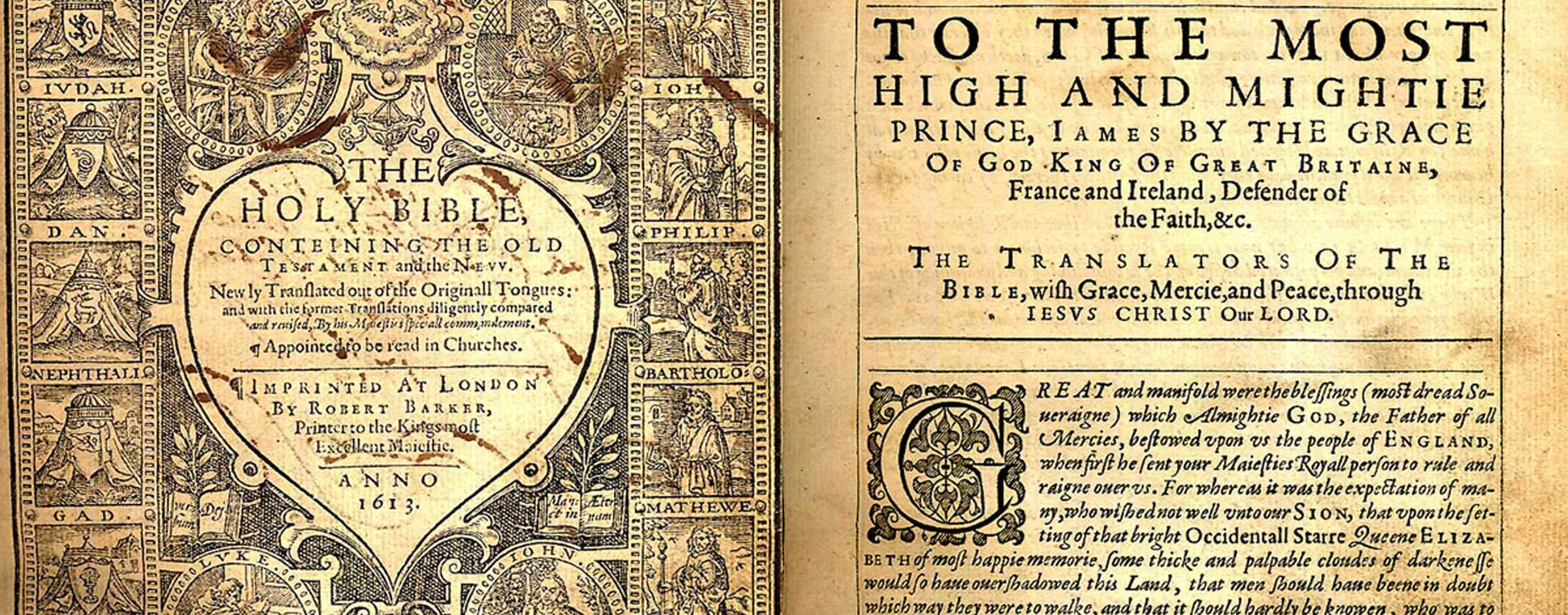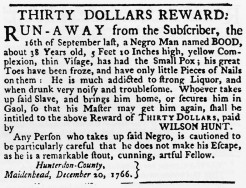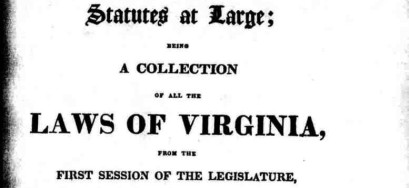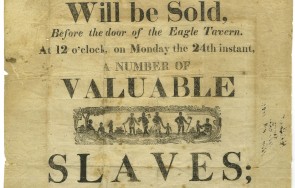Centuries of religious, economic, social, and political thought sanctioned slavery. Abolitionists faced an uphill battle.
Ancient & Medieval Philosophy | The Bible | American Law | Videos | Lesson Plans
What did ancient and medieval philosophers think about slavery?
Plato
…nature herself intimates that it is just for the better to have more than the worse, the more powerful than the weaker; and in many ways she shows, among men as well as among animals, and indeed among whole cities and races, that justice consists in the superior ruling over and having more than the inferior.
St. Augustine
The prime cause, then, of slavery is sin, which brings man under the dominion of his fellow — that which does not happen save by the judgment of God, with whom is no unrighteousness, and who knows how to award fit punishments to every variety of offence.
Thomas Aquinas
For men of outstanding intelligence naturally take command, while those who are less intelligent but of more robust physique, seem intended by nature to act as servants.
Aristotle
For that some should rule and others be ruled is a thing not only necessary, but expedient; from the hour of their birth, some are marked out for subjection, others for rule…
The Dialogus de Scaccario
Likewise if a man of whatsoever condition, or the slave or freeman of whatsoever lord, through fear of the more rigid law which the king has established on account of criminals, shall flee from his home, and, during the terms fixed and defined by law, shall not have presented himself or excused himself, or also if, the neighbourhood raising a hue against him, being suspected and afterwards taken, he shall be convicted by the fixed law of the assize as guilty of the crime .
Henry of Bracton
The Law says one captured by the enemy is a slave.
Franco Sacchetti
Can a slave man or woman, born an infidel, bought in an infidel country be still bought and sold after baptism? I should say yes.
Aurelius Ambrosius
The one who could not command and rule the other ought to have served him, in order to be ruled by the one who was more wise.
Basil of Caesarea
It is better for a man who lacks intelligence and self control to become another’s possession.
Theodoret of Cyrus
The role of master is fraught with care while that of slave has numerous advantages.
Origen Adamantius
Not without merit, therefore, does the discolored posterity imitate the ignoble race… Nowhere does the divine law entertain concern for Egyptian freedom, because they had lost it willingly. It leaves them to the eternal yoke of their condition and perpetual bondage.
What does the Bible say about slavery?
Both antislavery activists and proslavery apologists relied on the Bible to make their arguments. Here are the most commonly used verses to both defend and attack slavery. Read the passages and compare the antislavery and proslavery sentiments in each.
Exodus 21:2-6
If thou buy an Hebrew servant, six years he shall serve: and in the seventh he shall go out free for nothing. If he came in by himself, he shall go out by himself: if he were married, then his wife shall go out with him. If his master have given him a wife, and she have born him sons or daughters; the wife and her children shall be her master’s, and he shall go out by himself. And if the servant shall plainly say, I love my master, my wife, and my children; I will not go out free:Then his master shall bring him unto the judges; he shall also bring him to the door, or unto the door post; and his master shall bore his ear through with an aul; and he shall serve him for ever.
Exodus 21:7-12
And if a man sell his daughter to be a maidservant, she shall not go out as the menservants do. If she please not her master, who hath betrothed her to himself, then shall he let her be redeemed: to sell her unto a strange nation he shall have no power, seeing he hath dealt deceitfully with her. And if he have betrothed her unto his son, he shall deal with her after the manner of daughters. If he take him another wife; her food, her raiment, and her duty of marriage, shall he not diminish. And if he do not these three unto her, then shall she go out free without money.
Exodus 21:16
And he that stealeth a man, and selleth him, or if he be found in his hand, he shall surely be put to death.
Exodus 21:26-27
And if a man smite the eye of his servant, or the eye of his maid, that it perish; he shall let him go free for his eye’s sake. And if he smite out his manservant’s tooth, or his maidservant’s tooth; he shall let him go free for his tooth’s sake.
Leviticus 19:20
And whosoever lieth carnally with a woman, that is a bondmaid, betrothed to an husband, and not at all redeemed, nor freedom given her; she shall be scourged; they shall not be put to death, because she was not free.
Leviticus 25:39-46
And if thy brother that dwelleth by thee be waxen poor, and be sold unto thee; thou shalt not compel him to serve as a bondservant: But as an hired servant, and as a sojourner, he shall be with thee, and shall serve thee unto the year of jubile. And then shall he depart from thee, both he and his children with him, and shall return unto his own family, and unto the possession of his fathers shall he return. For they are my servants, which I brought forth out of the land of Egypt: they shall not be sold as bondmen. Thou shalt not rule over him with rigour; but shalt fear thy God. Both thy bondmen, and thy bondmaids, which thou shalt have, shall be of the heathen that are round about you; of them shall ye buy bondmen and bondmaids. Moreover of the children of the strangers that do sojourn among you, of them shall ye buy, and of their families that are with you, which they begat in your land: and they shall be your possession. And ye shall take them as an inheritance for your children after you, to inherit them for a possession; they shall be your bondmen for ever: but over your brethren the children of Israel, ye shall not rule one over another with rigour.
Deuteronomy 23:15
Thou shalt not deliver unto his master the servant which is escaped from his master unto thee
Proverbs 29:21
He that delicately bringeth up his servant from a child shall have him become his son at the length.
Proverbs 30:10
Accuse not a servant unto his master, lest he curse thee, and thou be found guilty.
Luke 12:47-48
And that servant, which knew his lord’s will, and prepared not himself, neither did according to his will, shall be beaten with many stripes.
Romans 13:1-8
Let every soul be subject unto the higher powers. For there is no power but of God: the powers that be are ordained of God. Whosoever therefore resisteth the power, resisteth the ordinance of God: and they that resist shall receive to themselves damnation. For rulers are not a terror to good works, but to the evil. Wilt thou then not be afraid of the power? do that which is good, and thou shalt have praise of the same: For he is the minister of God to thee for good. But if thou do that which is evil, be afraid; for he beareth not the sword in vain: for he is the minister of God, a revenger to execute wrath upon him that doeth evil. Wherefore ye must needs be subject, not only for wrath, but also for conscience sake. For for this cause pay ye tribute also: for they are God’s ministers, attending continually upon this very thing. Render therefore to all their dues: tribute to whom tribute is due; custom to whom custom; fear to whom fear; honour to whom honour. Owe no man any thing, but to love one another: for he that loveth another hath fulfilled the law.
1 Corinthians 7:21-23
Art thou called being a servant? care not for it: but if thou mayest be made free, use it rather. For he that is called in the Lord, being a servant, is the Lord’s freeman: likewise also he that is called, being free, is Christ’s servant. Ye are bought with a price; be not ye the servants of men.
Galatians 3:28
There is neither Jew nor Greek, there is neither bond nor free, there is neither male nor female: for ye are all one in Christ Jesus.
Ephesians 6:5-9
Servants, be obedient to them that are your masters according to the flesh, with fear and trembling, in singleness of your heart, as unto Christ; Not with eyeservice, as menpleasers; but as the servants of Christ, doing the will of God from the heart; With good will doing service, as to the Lord, and not to men: Knowing that whatsoever good thing any man doeth, the same shall he receive of the Lord, whether he be bond or free. And, ye masters, do the same things unto them, forbearing threatening: knowing that your Master also is in heaven; neither is there respect of persons with him.
Colossians 3:11
Where there is neither Greek nor Jew, circumcision nor uncircumcision, Barbarian, Scythian, bond nor free: but Christ is all, and in all.
Colossians 4:1
Masters, give unto your servants that which is just and equal; knowing that ye also have a Master in heaven.
1 Peter 2:18-21
Servants, be subject to your masters with all fear; not only to the good and gentle, but also to the froward. For this is thankworthy, if a man for conscience toward God endure grief, suffering wrongfully. For what glory is it, if, when ye be buffeted for your faults, ye shall take it patiently? but if, when ye do well, and suffer for it, ye take it patiently, this is acceptable with God. For even hereunto were ye called: because Christ also suffered for us, leaving us an example, that ye should follow his steps:
1 Timothy 6:1-2
Let as many servants as are under the yoke count their own masters worthy of all honour, that the name of God and his doctrine be not blasphemed. And they that have believing masters, let them not despise them, because they are brethren; but rather do them service, because they are faithful and beloved, partakers of the benefit. These things teach and exhort.
Philemon 1:1-22
1 Paul, a prisoner of Jesus Christ, and Timothy our brother, unto Philemon our dearly beloved, and fellow labourer, And to our beloved Apphia, and Archippus our fellowsoldier, and to the church in thy house: Grace to you, and peace, from God our Father and the Lord Jesus Christ. I thank my God, making mention of thee always in my prayers, Hearing of thy love and faith, which thou hast toward the Lord Jesus, and toward all saints; That the communication of thy faith may become effectual by the acknowledging of every good thing which is in you in Christ Jesus. For we have great joy and consolation in thy love, because the bowels of the saints are refreshed by thee, brother. Wherefore, though I might be much bold in Christ to enjoin thee that which is convenient, Yet for love’s sake I rather beseech thee, being such an one as Paul the aged, and now also a prisoner of Jesus Christ. I beseech thee for my son Onesimus, whom I have begotten in my bonds: Which in time past was to thee unprofitable, but now profitable to thee and to me: Whom I have sent again: thou therefore receive him, that is, mine own bowels: Whom I would have retained with me, that in thy stead he might have ministered unto me in the bonds of the gospel: But without thy mind would I do nothing; that thy benefit should not be as it were of necessity, but willingly. For perhaps he therefore departed for a season, that thou shouldest receive him for ever; Not now as a servant, but above a servant, a brother beloved, specially to me, but how much more unto thee, both in the flesh, and in the Lord? If thou count me therefore a partner, receive him as myself. If he hath wronged thee, or oweth thee ought, put that on mine account; I Paul have written it with mine own hand, I will repay it: albeit I do not say to thee how thou owest unto me even thine own self besides. Yea, brother, let me have joy of thee in the Lord: refresh my bowels in the Lord. Having confidence in thy obedience I wrote unto thee, knowing that thou wilt also do more than I say. But withal prepare me also a lodging: for I trust that through your prayers I shall be given unto you.
Watch the following clips to further understand the tangled history of slavery in the Bible.
The Bible on Slavery Part I: Can Slavery be Removed from the Bible?
http://www.youtube.com/watch?v=VqJcSfio-4E
The Bible on Slavery Part II: Southern Clergy Support Slavery
This is a true story given by Underground Railroad Stationmaster Levi Coffin about a Southern minister he met on a boat on the Ohio River in 1850 that supports slavery.
The Bible on Slavery Part III: Does God/Moses Approve Slavery?
Here a friar in an interview from a fictional organization gives the exact passages in the book of Leviticus in the Old Testament that give the rules for handling slaves that were laid down by Moses from God on Mt.Sinai.
How did slaveholders gain political power?
The first slaves were brought to Virginia only a few years after the founding of the colony. But shifting from a society with slaves to a society dependent upon slavery required new laws. Read through a selection of laws enacted in seventeenth century Virginia to see how slaveowners used the law to create the system of American slavery.
VIRGINIA SLAVE LAWS
December 1662
Whereas some doubts have arisen whether children got by any Englishman upon a Negro woman should be slave or free, be it therefore enacted and declared by this present Grand Assembly, that all children born in this country shall be held bond or free only according to the condition of the mother; and that if any Christian shall commit fornication with a Negro man or woman, he or she so offending shall pay double the fines imposed by the former act.
September 1667
Whereas some doubts have risen whether children that are slaves by birth, and by the charity and piety of their owners made partakers of the blessed sacrament of baptism, should by virtue of their baptism be made free, it is enacted and declared by this Grand Assembly, and the auhority thereof, that the conferring of baptism does not alter the condition of the person as to his bondage or freedom; that diverse masters, freed from this doubt may more carefully endeavor the propagation of Christianity by permitting children, though slaves, or chose of greater growth if capable, to be admitted to that sacrament.
September 1668
Whereas it has been questioned whether servants running away may be punished with corporal punishment by their master or magistrate, since the act already made gives the master satisfaction by prolonging their time by service, it is declared and enacted by this Assembly that moderate corporal punishment inflicted by master or magistrate upon a runaway servant shall not deprive the master of the satisfaction allowed by the law, the one being as necessary to reclaim them from persisting in that idle course as the other is just to repair the damages sustained by the master.
October 1669
Whereas the only law in force for the punishment of refractory servants resisting their master, mistress, or overseer cannot be inflicted upon Negroes, nor the obstinacy of many of them be suppressed by other than violent means, be it enacted and declared by this Grand Assembly if any slave resists his master (or other by his master’s order correcting him) and by the extremity of the correction should chance to die, that his death shall not be accounted a felony, but the master (or that other person appointed by the master to punish him) be acquitted from molestation, since it cannot be presumed that premeditated malice (which alone makes murder a felony) should induce any man to destroy his own estate.
Source: William Waller Hening, Statutes at Large; Being a Collection of all the Laws of Virginia (Richmond, Va, 1809-23). Click here to read more.
Videos
America’s Earliest Africans
The Cotton Economy and Slavery
Many stakeholders benefited from the cotton economy — plantation owners in the South, banks in the North, shipping merchants, and the textile industry in Great Britain. Cotton transformed the United States, making fertile land in the Deep South, from Georgia to Texas, extraordinarily valuable. Growing more cotton meant an increased demand for slaves. Slaves in the Upper South became incredibly more valuable as commodities because of this demand for them in the Deep South. They were sold off in droves. This created a Second Middle Passage, the second largest forced migration in America’s history.
Priscilla, a Slave
Lesson Plans
A Comparison of Indentured Servants and Slaves – This elementary and middle level lesson evaluates the differences between indentured servants and slaves. Students will examine and compare the lives of each using primary sources and the historical fiction books, Molly Bannaky and Barefoot.
Slavery in Virginia – In this elementary level lesson, students will use primary sources to analyze the effects plantation life and slavery had on Colonial Virginia.
How Slavery Replaced Indentured Servitude – This elementary level lesson asks students to examine and evaluate the different perspectives that led to Africans becoming slaves (instead of indentured servants) for the colonists.

